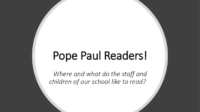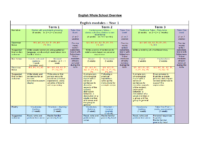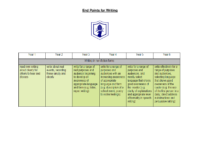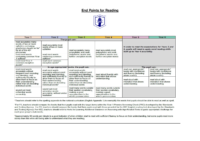English
English Curriculum Overview
Intent
It is our intention that our pupils acquire the necessary knowledge, skills and understanding to become lifelong learners and linguists. We strive to ensure that all our pupils receive a well-rounded learning experience when reading, writing, speaking and listening which will equip them with the fundamental tools to achieve in our school and beyond, and ultimately make a positive difference to our world . It is our intention to immerse pupils in the wonders of quality texts to instil a love for reading, a passion for discovery and a confidence to explore their imagination through our ambitious curriculum.
We recognise the importance of reading across the whole curriculum and its impact on the future success of pupils. Our pupils are taught to read confidently, fluently and with a good understanding. Pupils are encouraged to develop a habit of reading widely and often, for both pleasure and information through daily practise and whole school activities. Reading is at the heart of our curriculum and real texts are used to introduce topics across different subject areas including history, geography and science. Reading books are matched to each pupil’s phonic knowledge and reading ability. The Herts progression of skills is used to ensure development across the whole school.
Pupils are encouraged to use the school and class libraries to widen their reading experience. Regular adult led story telling enables pupils to access literature that is beyond their own reading level; this includes shared reading with parents and carers who attend the weekly drop-in reading sessions in EYFS.
Phonics is taught through our own carefully planned systematic, synthetic program, using a multi-sensory approach. Pupils are encouraged to apply their phonic knowledge independently through opportunities in child initiated learning. This knowledge develops a firm foundation for future learning of spelling in KS2.
Throughout our curriculum pupils are given many opportunities to articulate their learning during the school day and to speak in front of different audiences including Parish Mass, Class assemblies, performances for parents and reporting to the governing body. HfL English planning is used to ensure a clear progression of skills building to clear end points at the end of each year.
Whole school writing projects promote this through a shared book focus. Planned first hand, real life experiences for all pupils enhance and inspire purposeful writing and equip our pupils with the knowledge and cultural capital they need to achieve.
Implementation
All teachers have a good knowledge of the English curriculum. The English subject leaders ensure that teachers have a deep understanding of the sequence of learning and end points. Regular staff meeting time is allocated to updating knowledge and understanding of the curriculum. Best practice is shared and through pupil voice new initiatives are implemented.
Effective formative assessment allows pupils to embed and consolidate learning and to identify gaps and misconceptions. Clear direct feedback is provided through the marking policy; next steps for learning are shared and responded to. Teaching strategies are adapted in response to the needs of the individual learners. Reading and writing moderations take place half termly at school, local and county level, ensuring accurate and robust assessments.
Purposeful learning environments inspire all pupils; classroom books, apparatus, word banks and target sheets provide a wealth of support.
Impact
All pupils are well prepared for their next stage in education. They are confident pupils who have a life- long love of reading and writing. They are articulate linguists who can write for a range of purposes and value reading. Our pupils can express their views eloquently and enjoy speaking to a range of audiences. Pupils have the knowledge and skills they need to go on to destinations that meet their interests and aspirations.








